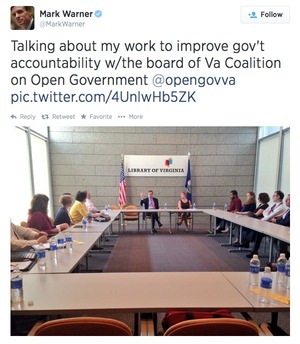Thursday, July 3, 2014
State and Local Stories
Yesterday VCOG had the pleasure of hosting Sen. Mark Warner (D) for a discussion about open government. Warner, speaking to VCOG’s board and guests at the Library of Virginia, reviewed the Digital Accountability and Transparency Act (DATA), which he co-sponsored with Sen. Rob Portman (R-Ohio), Rep. Elijjah Cummings (D-Maryland) and Rep. Darrell Issa (R-California). DATA seeks to standardize federal financial reporting and will put all federal spending and government contracts online in a searchable and downloadable format.
 As it stands, there are hundreds of different reporting standards across the federal government. Not everyone calls the same thing an expenditure, for instance. Or, as Warner said Issa described it: it’s as though everyone in Major League Baseball had a different definition of what constituted a hit, an error or a strike. Warner and Issa wanted to figure out language that would allow citizens to follow the money from the moment it comes in to federal coffers. As it stands, there are hundreds of different reporting standards across the federal government. Not everyone calls the same thing an expenditure, for instance. Or, as Warner said Issa described it: it’s as though everyone in Major League Baseball had a different definition of what constituted a hit, an error or a strike. Warner and Issa wanted to figure out language that would allow citizens to follow the money from the moment it comes in to federal coffers.
The administration, including the Office of Management and Budget, was opposed to the measure, saying it part that it would place a burden on agencies. Yesterday, Warner countered that such legislation is supposed to help employees, who are being asked to do more with less.
He acknowledged that a front-end investment in technology will be required to get DATA working and was open to the possibility of private sector support. He cautioned, however, that private involvement isn’t a magic bullet.
“I’ve been in the private sector. We waste just as much money as the federal government,” he said. “The people who say the private sector is the answer are the ones who’ve been in the public sector for 30 years.”
He urged those in the room to stay vigilant about DATA’s implementation to ensure that deadlines and marks are met.
Warner also fielded questions on the federal shield law, which would give some measure of protection to journalists who are ordered to testify about their confidential sources. The bill has made it out of its Senate committee but has not progressed further, a fact Warner pointed to in responding that he had not had a chance to learn about how the bill has developed and how it has dealt with the thorny issue of defining who would be allowed to use the privilege. He did say, however, that should the bill come to the Senate floor, he would vote in favor of a full debate.
Prosecutors have found no evidence that Richmond Chief Administrative Officer Byron C. Marshall committed a criminal act by boosting compensation for one of his deputies, Sharon Judkins, just as her employment with the city was coming to an end this year. In a report that will be released today, Richmond Commonwealth’s Attorney Michael N. Herring and his chief deputy, John C. Bullard, conclude that there was “absolutely no evidence of criminal wrongdoing.”
Times-Dispatch
Prosecutors say they might offer evidence in McDonnell’s upcoming corruption trial that he “deliberately omitted” from his Statement of Economic Interests the 10-day vacation at the Kiawah Island Golf Resort, which William H. Goodwin and his family own. The U.S. intends to offer “the draft SOEI on which Mr. McDonnell scratched through the Kiawah Island trip and wrote ‘personal’ in the margin,” as well as a gifts chart a staffer prepared for use in completing the disclosure form “on which Mr. McDonnell crossed out the Kiawah Island trip and wrote ‘Bill Goodwin pers friend’ and ‘check to see if personal or reportable.’” McDonnell’s concealment of the trip shows a pattern of behavior because he used the same “friend” exemption in Virginia law to hide gifts from Jonnie Williams Sr., then-CEO of Star Scientific, prosecutors say.
Times-Dispatch
Court documents filed June 24 related to the now-dismissed recall petition against Loudoun County Supervisor Eugene Delgaudio suggest Delgaudio may have broken county hiring policy by asking a Sterling woman seeking a public position her views on homosexuality, politics and religion. In an interview with the Times-Mirror, Delgaudio (R-Sterling) did not dispute that he asked questions about social issues, gay marriage and religion while interviewing the woman for a county-funded position, and a formal investigation into Delgaudio's office by Arlington Commonwealth's Attorney Theo Stamos found the “supervisor did ask potential staffers their views on a number of politically sensitive subjects." The county's General Principles and Governing Policies document states the Board of Supervisors has “declared that the county does not discriminate against employees or applicants for employment based on political affiliation, sexual orientation, or gender identity.”
Loudoun Times-Mirror
In an effort to keep citizens better informed, the Pittsylvania County Board of Supervisors will publish its first “Citizen News” newsletter as a special pull-out section in July 23 edition of the Star-Tribune. The Star-Tribune will have a mass mailing that week and each home in the county — approximately 35,000 — will receive a free newspaper with the county’s newsletter inside. “The Board of Supervisors recognizes that information is a key ingredient for success in engaging the citizenry,” said Chairman Jessie Barksdale. “Serving the residents of Pittsylvania County is very important to us, and the key part of this service is keeping the flow of information as far reaching as possible,” Barksdale said.
Star Tribune |